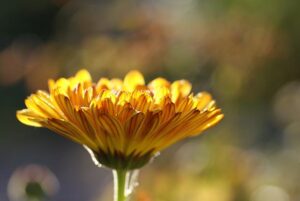Calendula: (Calendula officinalis) Also known as Pot marigold
 The ancient Romans named Calendula after they saw it bloom the first day or “calends” of every month. For centuries this plant was associated with the sun and believed to open with the sunrise and close with the sunset.
The ancient Romans named Calendula after they saw it bloom the first day or “calends” of every month. For centuries this plant was associated with the sun and believed to open with the sunrise and close with the sunset.
The plant has erect angular branched stems with fine hairs. Flowers are rays in solitary terminal heads 1.5 to 4 inches across, yellow to orange in color and close up at night.
Calendula (Calendula officinalis), also known as pot marigold, is a flowering plant. It is not the same as Tagetes genus decorative marigolds. It is a flowering plant native to Asia and southern Europe that has long been utilized in Ayurvedic and Unani therapy. Its compounds may aid in the growth of new tissue in wounds and reduce swelling in the mouth and throat.
Its flower is used to treat wounds, rashes, infections, inflammation, and a variety of other ailments.
Herbal uses are medicinal, culinary, decorative and cosmetic.
Calendula Medicinal Uses:
Calendula is said to to be a wound healer both internally and externally. It’s antifungal and antibacterial properties of the herb aid in infection prevention and tissue healing that may aid in the battle against cancer, heart disease, and muscle weariness.
Culinary:
Flowers can be dried and ground and used as a good substitute for the color saffron provides in soups, stews, and poultry. Flowers can also be used for a culinary dye in butters and custards.
Decorative:
Dry flowers can be used in arrangements. Calendula also makes a pale yellow dye for fabrics.
Cosmetic:
Add to skin cream and also use in herbal bath mix to stimulate the body.
Precautions:
It is likely safe for most people with the follow among the exceptions.
Avoid use during pregnancy.
Calendula may produce an allergic reaction in persons who are allergic to the Asteraceae/Compositae family of plants. Ragweed, chrysanthemums, marigolds, daisies, and many other plants belong to this family. If you have allergies, consult your doctor before using calendula.
It can make you sleepy and reduce your breathing. Sedative drugs, for example, can make you sleepy and slow your breathing. If used with sedative drugs may induce respiratory issues and/or excessive tiredness.
Want to easily grow this and other tried and true medicinal herbs? Grow here!
